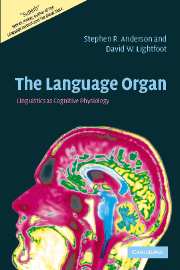Book contents
- Frontmatter
- Contents
- Preface
- 1 Studying the human language faculty
- 2 Language as a mental organ
- 3 Syntax
- 4 Sound patterns in language
- 5 Describing linguistic knowledge
- 6 Phonetics and the I-linguistics of speech
- 7 Morphology
- 8 Language change
- 9 “Growing” a language
- 10 The organic basis of language
- References
- Index
10 - The organic basis of language
Published online by Cambridge University Press: 03 December 2009
- Frontmatter
- Contents
- Preface
- 1 Studying the human language faculty
- 2 Language as a mental organ
- 3 Syntax
- 4 Sound patterns in language
- 5 Describing linguistic knowledge
- 6 Phonetics and the I-linguistics of speech
- 7 Morphology
- 8 Language change
- 9 “Growing” a language
- 10 The organic basis of language
- References
- Index
Summary
Our ability to speak and understand a natural language results from – and is made possible by – a richly structured and biologically determined capacity specific both to our species and to this domain. In this chapter we review arguments that show that the language faculty is a part of human biology, tied up with the architecture of the human brain, and distinct at least in significant part from other cognitive faculties. We also discuss some of the work that has tried to link the language organ with specific brain tissue and its activity.
Previous chapters have explored the structure of various components of our language organ, and some aspects of the course by which that structure arises. Some component of the mind must be devoted to language, and in its original state (determined by Universal Grammar (UG)), prior to any actual linguistic experience, it seems predisposed to infer certain quite specific sorts of system on the basis of limited and somewhat degenerate data. This is what we mean when we say that our language organ can be described by a grammar, and the shape of particular grammars is determined by the system of UG as this interprets the primary linguistic data available during the period of growth of the language organ.
Thus far, our description is largely an abstract or functional one: that is, it does not depend on the specific properties of the physical system that realizes it. For a parallel, consider the nature of multiplication.
- Type
- Chapter
- Information
- The Language OrganLinguistics as Cognitive Physiology, pp. 216 - 243Publisher: Cambridge University PressPrint publication year: 2002



